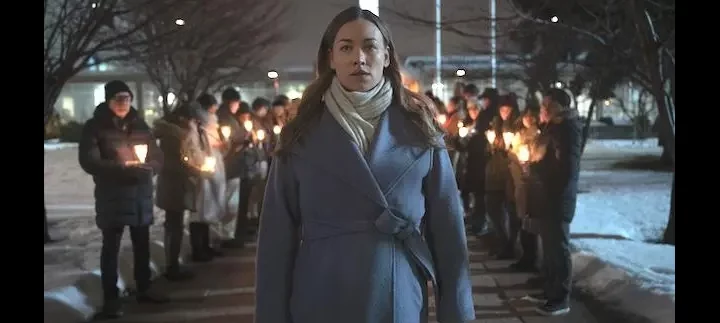The much-anticipated return of The Handmaid’s Tale, a TV series based on the post-apocalyptic novel by Margaret Atwood, was just released.
Last season ended with the murder of Commander Fred Waterford, who played a large part in the creation of a new country aided by a new religion that uses a narrow view of Scripture to command a nation called Gilead. In the United States, as women mysteriously began to be unable to conceive children, a minority overthrew the government and created their own world order.

Julia Goldie Day
Handmaids, the few women still able to conceive, were needed to bring a new generation of children into this new and horrible world. They were raped in the name of God by commanders — held down by their barren wives — in a religious ceremony to produce children that would be ripped away and raised just beyond their reach.
Handmaids who had escaped Gilead gathered in the woods, where they found Fred Waterford. In a gruesome scene, the women used their hands, fingernails and teeth to kill their oppressor. June Osbourn, the main character, bit off the commander’s left ring finger and mailed it to his wife, who had held her down while being raped.
In this new season’s first episode, we follow June as she arrives to meet her fellow handmaids in a diner. The scene is mostly silent as the women turn to see June, their leader. Faces are smeared with blood; fingernails are caked with flesh and blood. June sits at a table with some of the women who offer her food and drink. June thirstily gulps a glass of orange juice. Pancakes, bacon and eggs are placed on her plate.
In an amazing scene of hunger and need, echoing their dark deed, the women tear into the food. We see them chew, enjoy and eat their fill until, finally, they are sated. They are silent as they consider the bloody justice they have just enacted.
“We don’t often see women eating in this way on film.”
As I watch, I’m struck by the women’s hunger for power. I’m struck by their desire for food and drink that truly fulfils. We don’t often see women eating in this way on film. Unhindered, animalistic even, considering what these women have become capable of because of their trauma. Bloody fingerprints remain on empty glasses and utensils as we survey this sort of Last Supper.
The women are deeply changed by this moment. They sacrificed a bit of their humanity for what they deemed was justice. They were treating their victim as they had been treated — as less than human, hardly deserving of life.
In the chaos that ensues, June turns herself in to the Canadian authorities. Still feeling embedded in Gilead’s system of “an eye for an eye,” she is shocked to learn she will not be punished due to a technicality. She is charged with a minor offense since she transported bodily material — remember the finger — and will pay a small fine.
The episode ends with June picking up her distraught young daughter from the bath. They hold each other. The crying subsides. The mother with child is reborn, rebaptized, redeemed.
“The imagery is not lost on women, who most know the gnaw of hunger for justice.”
The imagery is not lost on women, who most know the gnaw of hunger for justice. There is no male savior in this tale; the mothers take the mantle of justice upon their own shoulders. Here vengeance belongs to the women, and the women are God’s own hands.
While rape is santioned in fictional Gilead, rape culture in our world allows powerful men to “posture as victims, a phenomenon captured in the phrase male fragility” to escape accountability, says author and pastor Ruth Everhart in her book, The #MeToo Reckoning. Men can act and have power over women without fear of consequence. Women have little power to prevent being acted upon, yet they are the ones who pay the price — often publicly shamed after also becoming a victim.
We can remember the angry and tearful words of Supreme Court Judge Brett Kavanaugh during his hearings in 2018 as an example of male fragility. Kavanaugh was allowed to be angry, combative and ugly, while his accuser, Christine Blasey Ford, had to be careful to maintain a tone of respect and deference.
“We witness a fascinating reversal of power as the women save themselves.”
In the Handmaid’s Tale we witness a fascinating reversal of power as the women save themselves. The man becomes the victim without power. It’s painful to watch and yet difficult to avert your eyes. Rare consequence has come to bear, and it’s not pretty. It’s disturbing.
Perhaps we can see The Handmaid’s Tale as a form of lament — an expression of grief and sorrow often expressed in the Psalms. A public form of lament that is disruptive can lead to change, says Everhart.
I lift my own voice in lament for the women we have failed. For the women who have been silenced to protect powerful men. God requires that we stomach this difficult truth — that the need for justice must be sated.
Julia Goldie Day is ordained through the Cooperative Baptist Fellowship and lives in Memphis, Tenn. She is a painter and proud mother to Jasper, Barak and Jillian. Learn more at her website.
Related articles:
How Miss Marple and British crime fiction help us explore mysteries of the soul | Opinion by Susan Shaw
Welcome to Gilead | Opinion by Susan Shaw
White evangelicals want to control you so their kids can live forever | Analysis by Rick Pidcock


